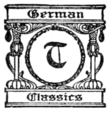THE ROMANTIC PHILOSOPHERS—FICHTE.
SCHELLING, AND SCHLEIERMACHER
By Frank Thilly, Ph.D., LL.D.
Professor of Philosophy, Cornell University
 HE Enlightenment of the eighteenth century had implicit faith in the powers of human reason to reach the truth. With its logical-mathematical method it endeavored to illuminate every nook and corner of knowledge, to remove all obscurity, mystery, bigotry, and superstition, to find a reason for everything under the sun. Nature, religion, the State, law, morality, language, and art were brought under the searchlight of reason and reduced to simple and self-evident principles. Human institutions were measured according to their reasonableness; whatever was not rational had no raison d'être, to demolish the natural and historical in order to make room for the rational became the practical ideal of the day. Enlightenment emphasized the worth and dignity of the human individual, it sought to deliver him from the slavery of authority and tradition, to make him self-reliant in thought and action, to obtain for him his natural rights, to secure his happiness and perfection in a world expressly made for him, and to guarantee the continuance of his personal existence in the life to come. In Germany this great movement found expression in a popular commonsense philosophy which proved the existence of God, freedom, and immortality, and conceived the universe as a rational order designed by an all-wise and all-good Creator for the benefit of man, his highest product; while other thinkers regarded Spinozism as the only rational system, indeed as the last word of all speculative metaphysics; for them logical
HE Enlightenment of the eighteenth century had implicit faith in the powers of human reason to reach the truth. With its logical-mathematical method it endeavored to illuminate every nook and corner of knowledge, to remove all obscurity, mystery, bigotry, and superstition, to find a reason for everything under the sun. Nature, religion, the State, law, morality, language, and art were brought under the searchlight of reason and reduced to simple and self-evident principles. Human institutions were measured according to their reasonableness; whatever was not rational had no raison d'être, to demolish the natural and historical in order to make room for the rational became the practical ideal of the day. Enlightenment emphasized the worth and dignity of the human individual, it sought to deliver him from the slavery of authority and tradition, to make him self-reliant in thought and action, to obtain for him his natural rights, to secure his happiness and perfection in a world expressly made for him, and to guarantee the continuance of his personal existence in the life to come. In Germany this great movement found expression in a popular commonsense philosophy which proved the existence of God, freedom, and immortality, and conceived the universe as a rational order designed by an all-wise and all-good Creator for the benefit of man, his highest product; while other thinkers regarded Spinozism as the only rational system, indeed as the last word of all speculative metaphysics; for them logical
[1]
